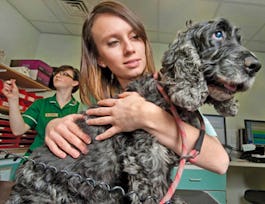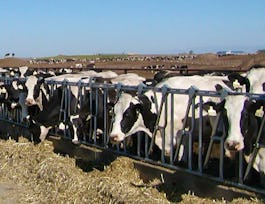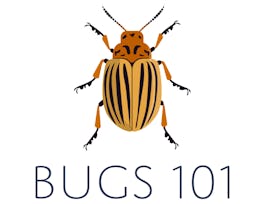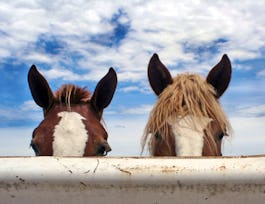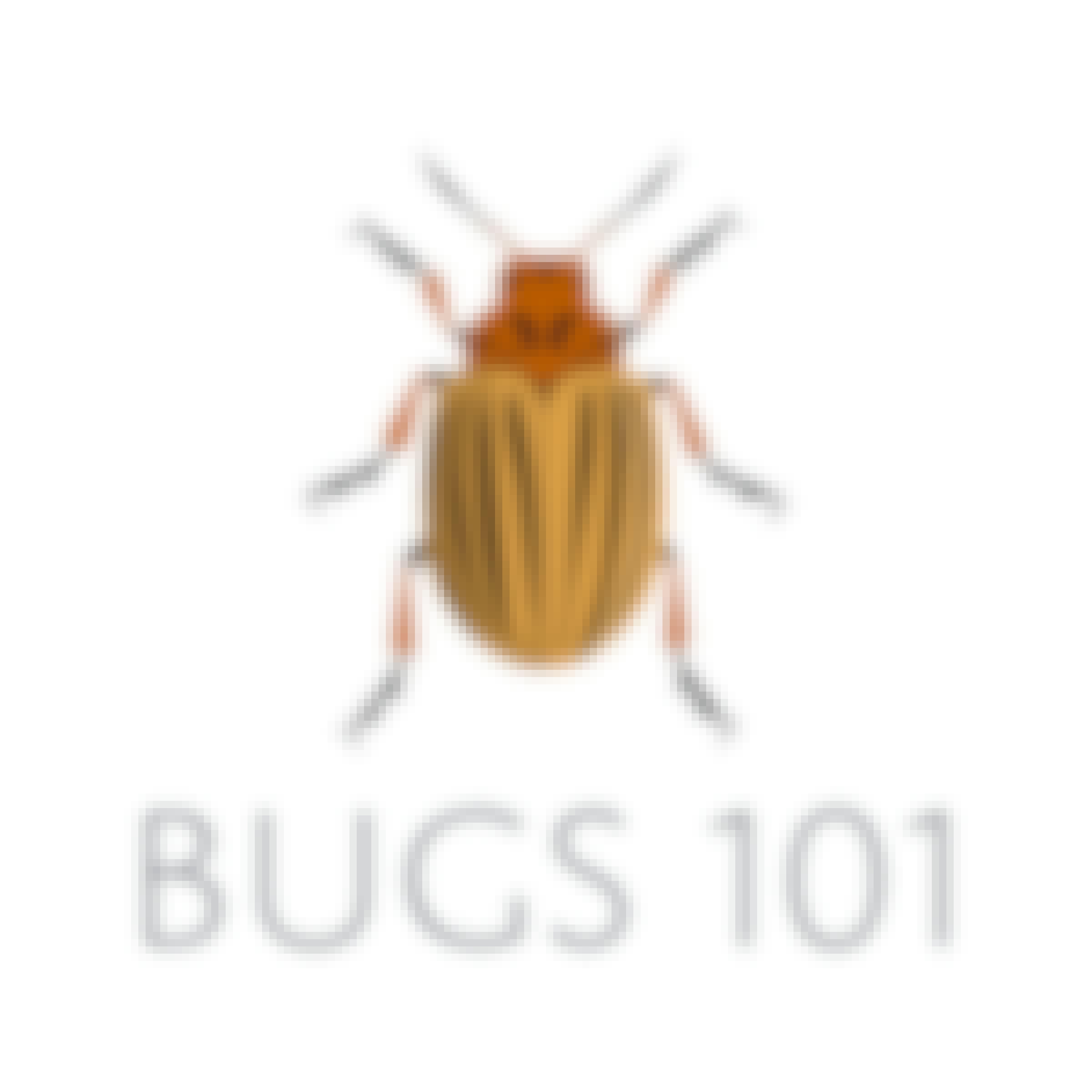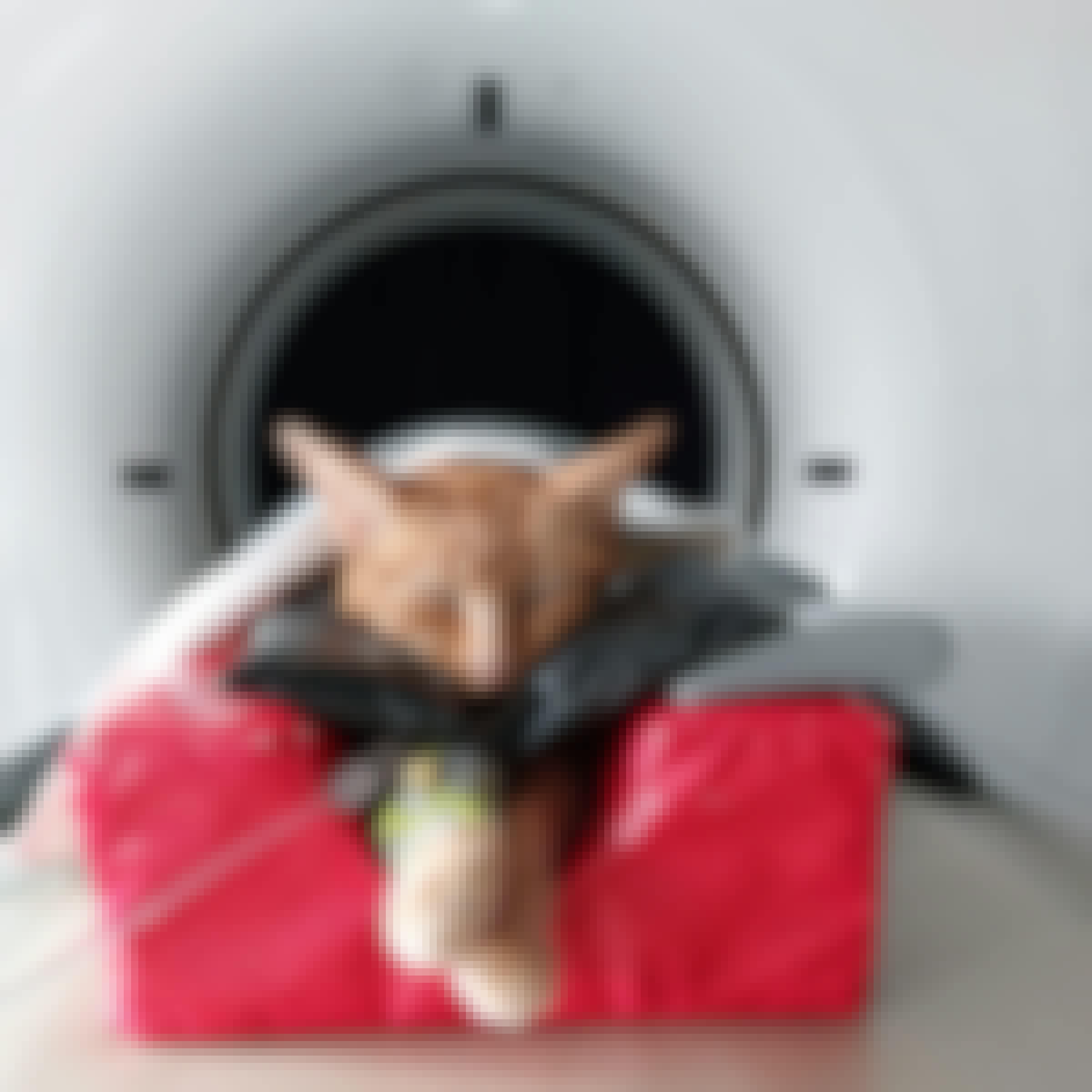Animal Health
Earn Your Degree
Most Popular Courses
Top Rated Courses
Most Popular Certificates
Frequently Asked Questions about Animal Health
Animal health includes all aspects necessary to ensure the well-being of animals, including disease prevention and treatment, veterinary medicine, nutrition, proper handling and care, and more. Animal health is closely related to the broader concept of animal welfare, which is defined by the American Veterinary Medical Association as “how an animal is coping with the conditions in which it lives.” These fields cover the health of both pets kept for companionship as well as livestock and other farm animals.
The study of animal health is important--and challenging--in part because animals are limited in their ability to care for themselves and cannot directly express their needs verbally. Traditionally, animal health professionals had to rely largely on expert knowledge of animal behavior to diagnose illnesses, injuries, or other health issues. However, the ability to gather and analyze much more in-depth data on the health of animal populations as well as individual animals has provided valuable new tools in bioinformatics.
Regardless of the types of animals in question or the methods of diagnosis used, animal health is a growing part of the healthcare marketplace. Caring for the health of livestock and farm animals is particularly important, as outbreaks of diseases can have significant impact on public health and safety as well as consumer food prices.
Just as animal health is a wide-ranging topic of study, there are a number of different career pathways available to people interested in this field. Perhaps the most familiar animal health professionals are veterinarians, who are equivalent to doctors in this field and are generally required to have a Doctor of Veterinary Medicine degree from an accredited university as well as state-issued licenses to practice.
According to the Bureau of Labor Statistics, the employment of veterinarians is projected to increase by 18% from 2018 to 2028--a much faster growth rate than jobs in the rest of the economy. Similarly, employment of veterinary technicians, who are responsible for administering medical tests to diagnose animal health issues, is projected to increase by 19% over this period.
The opportunities to work in animal health don’t stop there. Wildlife biologists and wildlife rehabilitators study the condition of animals in natural ecosystems, and help restore injured animals back to health before they are returned to the wild. Animal behaviorists and trainers are experts on understanding why animals act the way they do. And there are a growing number of jobs providing services to pet owners, including pet insurance agents, animal psychologists, and even animal massage therapists.
In other words, if you love animals, there are plenty of opportunities to work in animal health, regardless of your skill set.
Compared to on-campus alternatives, online learning options for animal health can offer advantages such as lower costs and greater flexibility in pursuing the exact same level of education.
As the world’s leading online learning platform, Coursera offers a wide range of animal health-related courses from top universities like Duke University, University of Florida, University of Edinburgh, and Penn State. A survey of the most popular courses on the platform demonstrates the breadth of animals you can learn about online. Courses on topics like veterinary medicine, animal behavior and welfare, animal psychology, and even The Truth About Cats and Dogs are available to match your interests and goals--whether it’s launching a career in animal health or just better understanding your own pets or farm animals.
Coursera's animal health courses offer content in various aspects of veterinary care and animal science:
- Fundamentals of animal anatomy and physiology
- Techniques for diagnosing and treating common animal diseases
- Best practices for animal nutrition and wellness management
- Preventive healthcare measures to maintain optimal animal health
- Emergency care and first aid for animals
- Understanding of zoonotic diseases and their management
- Ethical considerations in veterinary practice
Animal health courses on Coursera are suitable for various levels of knowledge and interest:
- Introductory courses that are open to anyone interested in animal care and do not require previous experience.
- Intermediate courses targeted at pet owners, animal care workers, or students with some foundational knowledge who want to expand their skills.
- Advanced courses designed for veterinary professionals or those pursuing a career in veterinary medicine or animal science.
Coursera offers a range of credentials in collaboration with veterinary colleges and animal health institutions:
- Professional certificates that prepare you for roles in veterinary practices or animal health industries.
- Specialized course certificates that demonstrate proficiency in specific areas such as small animal care, equine health, or wildlife conservation.
- Continuing education credits for veterinary professionals looking to fulfill licensure requirements or expand their clinical skills.
Skills acquired from animal health courses on Coursera can lead to rewarding career paths:
- Veterinary Technician, assisting veterinarians in clinics and animal hospitals.
- Animal Care Specialist, working in shelters, zoos, or wildlife sanctuaries.
- Veterinary Sales Representative, offering specialized products and services to veterinary practices.
- Wildlife Conservationist, protecting and managing wild animal populations.
- Researcher in Animal Science, studying animal biology and health to improve care and treatment methods.
Many people who study animal health go on to work in veterinarian offices, but the opportunities don't stop there. You can work on a farm, in a zoo, in an aquarium, in an animal shelter, at an animal rehabilitation center, or at a national park. You can work as an educator at the high school or college levels, or you may enter the field of research and work for a lab, university, private company, or government agency.
Online Animal Health courses offer a convenient and flexible way to enhance your knowledge or learn new Animal Health skills. Choose from a wide range of Animal Health courses offered by top universities and industry leaders tailored to various skill levels.
When looking to enhance your workforce's skills in Animal Health, it's crucial to select a course that aligns with their current abilities and learning objectives. Our Skills Dashboard is an invaluable tool for identifying skill gaps and choosing the most appropriate course for effective upskilling. For a comprehensive understanding of how our courses can benefit your employees, explore the enterprise solutions we offer. Discover more about our tailored programs at Coursera for Business here.









